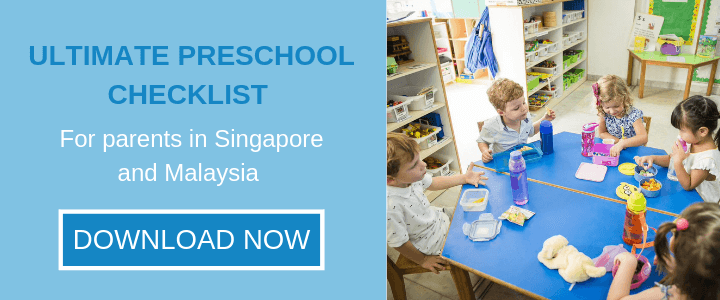Home >
Blog >
The importance of preschool for children
The importance of preschool for children
.jpg)
Feb 25, 2020 4:27:43 PM
Are you thinking about sending your child to preschool but unsure whether this is the right decision? Maybe you are worried about how your child might cope with the separation? Though preschool sets the foundation for your child’s educational journey, it can be a very difficult decision for parents for several reasons, from cost to the impact of early academics. In this blog we will explore those concerns and outline the value and importance of preschool for young children.
WHAT IS PRESCHOOL?
A preschool provides childcare and educational services as well as developmental programmes for children aged between eighteen months and seven years old. The main aim is to provide children with a smooth transition into primary school through holistic learning experiences. Through preschool, children learn and acquire many cognitive, language, physical, independent, emotional and social skills. This is achieved through activities such as Music and Movement, arts and crafts, sensory, cookery, literacy, numeracy and science.
WHY SOME PARENTS MAY BE WARY ABOUT SENDING THEIR CHILD TO PRESCHOOL
- Focus on academics – some parents may not want to overwhelm their children with academics at an early age. However, selecting a preschool with a curriculum that targets additional areas including critical thinking skills, social and emotional development such as through play-based, Montessori or Reggio Emilia approaches, can provide your child with a good balance between academics and personal development.
- Costs – the cost of preschool can vary from thousands to tens of thousands a year, making access to high-quality education challenging for many parents and carers. Fortunately, there are childcare subsidies that parents can take advantage of to reduce the cost of preschool.
- Lack of one-on-one time – some teachers may be given large classes to manage, which can make it difficult to meet the individual needs of each child. A way to avoid this is by choosing a preschool with a low student-teacher ratio.
- Separation anxiety – for some children, it can be difficult to adjust to spending time away from their parents. We share some tips on how to deal with separation anxiety in our blog.
THE VALUE OF PRESCHOOL FOR YOUNG CHILDREN
- Social and emotional development – Children develop a range of social skills and behaviours such as learning how to get along with others and sharing (often through groupwork activities). In addition to helping with self-confidence, these are all critical skills for emotional intelligence. This is supported by a meta-analysis by Camilli, Vargas, Ryan, & Barnett (2010) using data from 123 studies on the cognitive and social effects of early education interventions. The study found that children who partook early childhood interventions such as preschool had significantly higher social skills, school progress, and cognitive outcomes than those who did not.
- Exposure to different types of learning – preschool introduces children to a variety of learning styles e.g. visual, auditory or kinesthetic. Not only can this enhance flexibility, it can help teachers and parents identify the circumstances in which children learn best – hence can provide the right learning support in the future.
- Language and cognitive skills – children are introduced to new vocabulary and can familiarise themselves with everyday language e.g. greetings during arrival and home time, key phrases during snack time, and telling time. Teachers will also ask questions, giving children a chance to develop conversational skills.
- Early academics – pre-math and pre-literacy skills are introduced through beginner numbers and letters. These are taught in engaging ways e.g. singing the alphabet jingles and following picture books.
THE IMPORTANCE OF PRESCHOOL FOR SCHOOL READINESS
Parents want to ensure a child is ready to make a smooth transition into school. Preschool helps to achieve school readiness and marks the start a child’s journey to becoming a lifelong learner by nurturing their curiosity.
What our parents say: How has the Invictus Preschool curriculum helped prepare your child for the next phase of school?
- “Her social and communications skills has improved by leaps and bounds in the last few months….”
Jaya and Vikas, Parents of Ishani at Invictus International Preschool- “Jess loves everything about Invictus International Preschool - from the fantastic teachers to the varied and engaging curriculum on offer. She always has a spring in her step going to school…….I was worried about how Jess would find the transition to preschool, but she’s loved it, and it’s really developed her confidence….”
Mr. & Mrs. Noble, Parents of Jess at Invictus International Preschool West Coast
- “Even though it was for a short period of time, we were surprised by how fast Tanya adapted to school. We were impressed by the school’s programme and informative weekly updates with pictures”.
Mr & Mrs Rajkumar, Parents of Tanya at Invictus International Preschool Toa Payoh
SO, IS PRESCHOOL ESSENTIAL?
Overall, preschool provides children with a foundation for learning, both socially and academically. It has a significant impact on a child’s early development and provides numerous opportunities for growth. However, parents / carers must acknowledge that this is also dependant on the type of preschool selected and its curriculum, values and aims. The key is to match this with the individual needs of your child.
Need help selecting the right preschool? Check out our Ultimate Checklist on how to evaluate health and safety, curriculum, teaching style, licensing and much more.


